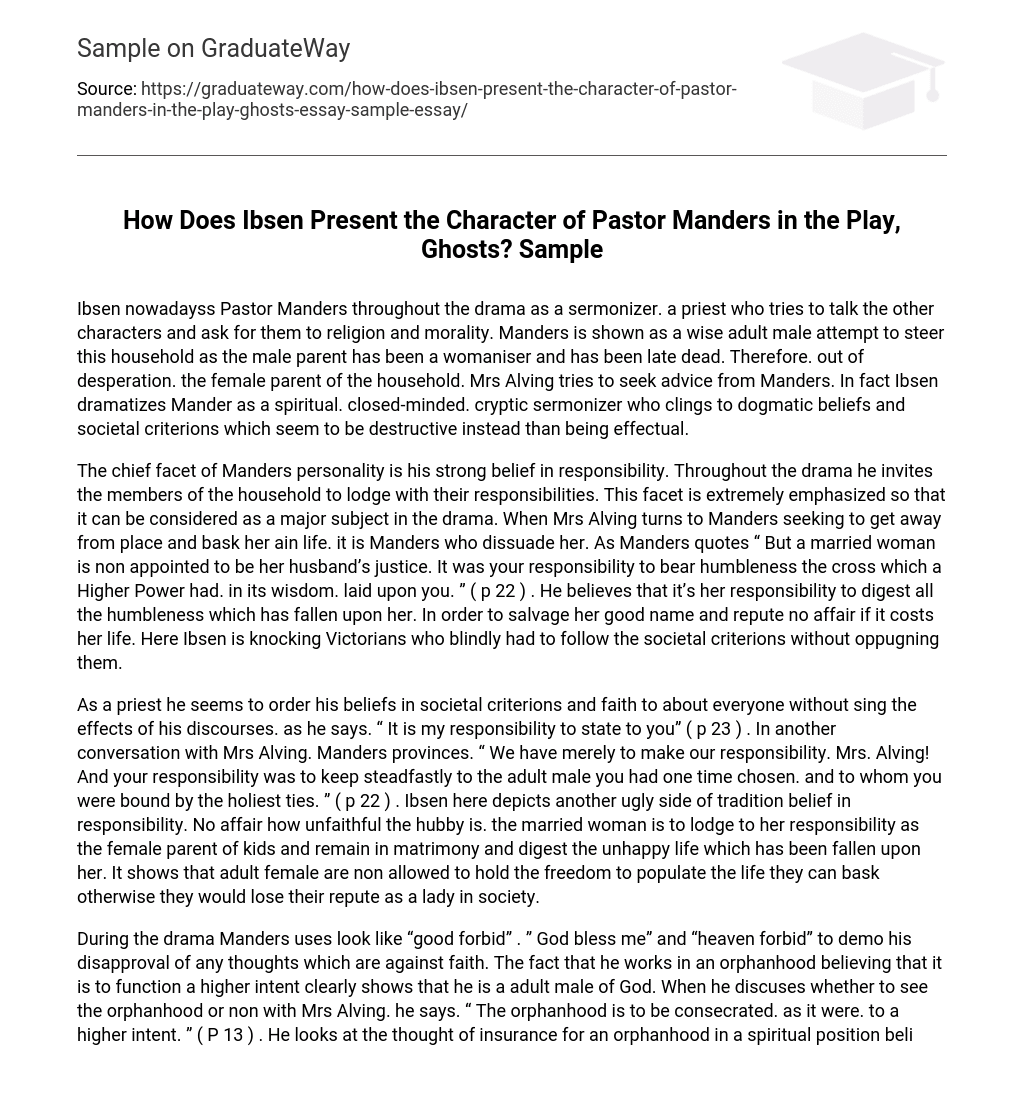Ibsen nowadayss Pastor Manders throughout the drama as a sermonizer. a priest who tries to talk the other characters and ask for them to religion and morality. Manders is shown as a wise adult male attempt to steer this household as the male parent has been a womaniser and has been late dead. Therefore. out of desperation. the female parent of the household. Mrs Alving tries to seek advice from Manders. In fact Ibsen dramatizes Mander as a spiritual. closed-minded. cryptic sermonizer who clings to dogmatic beliefs and societal criterions which seem to be destructive instead than being effectual.
The chief facet of Manders personality is his strong belief in responsibility. Throughout the drama he invites the members of the household to lodge with their responsibilities. This facet is extremely emphasized so that it can be considered as a major subject in the drama. When Mrs Alving turns to Manders seeking to get away from place and bask her ain life. it is Manders who dissuade her. As Manders quotes “ But a married woman is non appointed to be her husband’s justice. It was your responsibility to bear humbleness the cross which a Higher Power had. in its wisdom. laid upon you. ” ( p 22 ) . He believes that it’s her responsibility to digest all the humbleness which has fallen upon her. In order to salvage her good name and repute no affair if it costs her life. Here Ibsen is knocking Victorians who blindly had to follow the societal criterions without oppugning them.
As a priest he seems to order his beliefs in societal criterions and faith to about everyone without sing the effects of his discourses. as he says. “ It is my responsibility to state to you” ( p 23 ) . In another conversation with Mrs Alving. Manders provinces. “ We have merely to make our responsibility. Mrs. Alving! And your responsibility was to keep steadfastly to the adult male you had one time chosen. and to whom you were bound by the holiest ties. ” ( p 22 ) . Ibsen here depicts another ugly side of tradition belief in responsibility. No affair how unfaithful the hubby is. the married woman is to lodge to her responsibility as the female parent of kids and remain in matrimony and digest the unhappy life which has been fallen upon her. It shows that adult female are non allowed to hold the freedom to populate the life they can bask otherwise they would lose their repute as a lady in society.
During the drama Manders uses look like “good forbid” . ” God bless me” and “heaven forbid” to demo his disapproval of any thoughts which are against faith. The fact that he works in an orphanhood believing that it is to function a higher intent clearly shows that he is a adult male of God. When he discuses whether to see the orphanhood or non with Mrs Alving. he says. “ The orphanhood is to be consecrated. as it were. to a higher intent. ” ( P 13 ) . He looks at the thought of insurance for an orphanhood in a spiritual position believing that because it is to function a higher intent. God will protect it and there is no necessity to be covered by insurance. He believes God protects the orphanhood non the money paid to an insurance company. In another conversation with Mrs Alving. after she says that she had to digest her irresponsible hubby merely for “his small boy’s sake” and all he misfortune specially the fact that she had to direct her boy off merely to be far from her “polluted home” . what Manders states is “ You have so had a life of test. ” ( p 25 ) . Therefore he holds the spiritual belief that God has been proving her and adult male has to digest the agonies in this universe.
Social criterions of the Victorian period seem be extremely important to Pastor Manders. no affair how destructive they could be In his conversation with Oswald when they discuss the rules of matrimony. Manders strongly disagrees with a twosome go forthing together outside matrimony. In fact he considers test matrimony as indecency. As he says “ how is it possible that a-a immature adult male or immature adult female with indecency of feeling can digest to populate in that manner? ” ( p 20 ) . Even when Oswald states that “ What are they to make? A hapless immature artist-a hapless girl-marriage cost a great trade. What are they to make? ” ( p 20 ) . he believes that even if a miss and a male child are hapless. they have to execute societal rites. Otherwise they are non to populate together. Love for Manders seems to be less of import than societal criterions. Else where he values household and believe that the members of the household must be together. When Mrs Alving wishes that his boy would turn up with and she wouldn’t have to direct him off. Manders states that “ A child’s proper topographic point is. and must be at the place of his male parents. ” Manders seems to be nescient of soiled behaviours of Oswald’s male parent.
In decision. Ibsen dramatizes Manders as the stereotype of a priest in the Victorian period who tries to carry others to societal criterions. spiritual rules and responsibility without sing their destructive effects. In the beginning parts of the drama he is non cognizant of many jobs and keeps prophesying the household towards what he thinks is right. However after he realises the world he clings to religion and destine believing that it is their fate. They have to accept and believe that the universe is the phase where people pass through many tests and they have no control over their fate.





